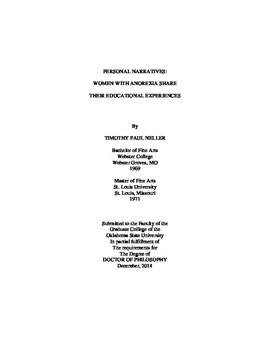| dc.contributor.advisor | Bailey, Lucy E. | |
| dc.contributor.author | Neller, Timothy Paul | |
| dc.date.accessioned | 2016-01-20T15:44:47Z | |
| dc.date.available | 2016-01-20T15:44:47Z | |
| dc.date.issued | 2014-12 | |
| dc.identifier.uri | https://hdl.handle.net/11244/25694 | |
| dc.description.abstract | The purpose of this qualitative study was to provide individual women who have been affected with anorexia with a voice to express how they narrate and understand their school experiences in order to explore the role that school has played in their lives. Ten women ranging in age from 21 to 66 participated in the study. Data sources included individual interviews, short follow-up interviews, participant written reflections, and researcher field notes and reflections. The study was grounded in an interpretivist theoretical perspective. The methodology of narrative inquiry guided the development of the study's design, data collection, and analysis processes. Data were analyzed through primarily thematic and some structural narrative analysis (Reissman, 2008) and concepts from feminist theory to explore both what was said and how the stories were structured in order to detect common themes. The women's stories described the various educational spaces in which they learned lessons about their bodies, formed their self-image, and adopted their gendered roles. Data analysis revealed many of the women were high achievers and perceived a thin female figure as an attractive ideal that would make them more socially acceptable. Most women in the study developed their anorexia during early adolescence after experiencing a broad spectrum of influential events. The study also revealed that peer pressure was a significant source of educational lessons for women in forming their perspectives on food and exercise. The women's educational experiences suggest that women had few, if any resources in their schools and in other educational spaces to learn about preventing or addressing anorexia. Their experiences also suggest that the curriculum of schools, written and unwritten, could have a major influence on young women's eating behaviors and self-image. This study contributes to understanding of the intersections between education and eating problems, demonstrates the need for schools to assume a more active role in prevention and aid, and provides additional insight into ways schools can help. | |
| dc.format | application/pdf | |
| dc.language | en_US | |
| dc.rights | Copyright is held by the author who has granted the Oklahoma State University Library the non-exclusive right to share this material in its institutional repository. Contact Digital Library Services at lib-dls@okstate.edu or 405-744-9161 for the permission policy on the use, reproduction or distribution of this material. | |
| dc.title | Personal narratives: Women with anorexia share their educational experiences | |
| dc.contributor.committeeMember | Wang, Hongyu | |
| dc.contributor.committeeMember | Zhao, Guoping | |
| dc.contributor.committeeMember | Kearney, Kerri S. | |
| osu.filename | Neller_okstate_0664D_13771.pdf | |
| osu.accesstype | Open Access | |
| dc.type.genre | Dissertation | |
| dc.type.material | Text | |
| thesis.degree.discipline | Social Foundations of Education | |
| thesis.degree.grantor | Oklahoma State University | |
